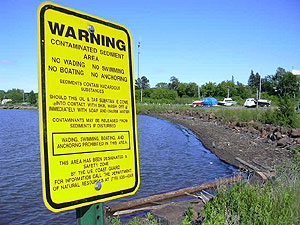|
Audio
Photos
Resources
Your Voice
|
Cleaning up an old mess
July 15, 2003
 |
| Signs warn people not to swim or boat in part of Chequamegon Bay. (MPR photo/Stephanie Hemphill) |
Ashland, Wisc. — The waves lapping gently on the beach at Kreher Park carry a thin film of oily scum. Bright yellow signs warn people not to wade in the water or run their boats in the bay.
It's not the kind of place that's likely to attract tourists. But that's exactly what Ashland's leaders, like city administrator David Frasher want to do.
 | |||
"We want to redevelop this site in a way that enhances the public's use and accessibility of the area," Frasher says. "And we want it to be pristine because we think that's the reason people come to Chequamegon Bay."
Ashland is about 60 miles east of Duluth. Its natural harbor was once busy with lumber mills, shipping, and a manufactured gas plant. For seventy years, until 1949, a company made gas to heat and light Ashland's homes.
Most cities had gas plants like this. The raw material was coal or petroleum. By-products were tars and oils in various thicknesses. Some of the waste was as solid as roofing tar, some was as runny as used engine oil. The gas company sold some of the by-products to other industries. It dumped the rest through a pipe into Chequamegon Bay.
"So we have the legacy of history," says Jerry Winslow, an engineer with Xcel Energy, formerly called NSP. NSP bought the manufactured gas plant in 1976. Now it's used as a place to repair equipment.
Winslow says other industries along the bay, including a city landfill, added their own pollution over the years.
 | |||
"Manufactured gas plant being one issue. Wood treating being another issue with the same kind of coal tar products. Landfill, which gets a little bit of everything."
Eight years ago the Wisconsin Department of Natural Resources began studying the pollution problems here. The tars and oils can cause cancer, and can damage reproductive and other organs.
Xcel and the DNR worked together to cover places on land where the pollutants were bubbling to the surface. And Xcel is slowly pumping the tars out of the deep aquifer that runs under the old plant and into the bay.
 | |||
The problem right now is the bay itself. The pollutants have settled on the bottom, and whenever there's a northeast wind, they get churned up and rise to the surface.
This area of Chequamegon Bay was listed as a Superfund site in 2002. So federal money was paying for the investigation. Now the Superfund program is nearly broke. So the EPA says Xcel should pay for the studies. Ashland's city manager, David Frasher, doesn't like that idea.
"From our view, the data's been collected and re-collected and collected again, mostly by Wisconsin DNR," Frasher says. "And now we're going to go back and spend a few more years collecting more data. And naturally we're suspicious when the fox is guarding the henhouse. We just want to make sure that somebody's watching the fox."
"Well, we've all been watching each other for years," replies Xcel's Jerry Winslow. He says the rules on Superfund sites include plenty of oversight by both the federal EPA and the Wisconsin DNR.
"We're not going to get to the end without all of us working together on this," he says.
 | |||
People in Ashland are wondering if they'll ever get to the end. David Frasher says he wouldn't be surprised if Xcel were purposely dragging its feet.
"I mean Xcel Energy's executives have told me themselves this site is they believe at least $50 million to clean up," he says. "Now with that figure in mind, you can see the value in deferring that payment."
But pollution cleanups only get more expensive as time goes by. Jerry Winslow has helped clean up several other manufactured gas sites. There are about 50 former plants in Wisconsin, and 30 in Minnesota. But most aren't so complicated to clean up because they weren't located on a lake or river.
"You don't have to worry about the fish," Winslow says. "The terns, the birds, the whole ecosystem, the worms, etc. etc. here we need to worry about that."
The EPA plans to decide by September whether Xcel should take over the investigation. Xcel says it'll be at least two more years before it comes up with options for clean-up.
|
News Headlines
|
Related Subjects
|
